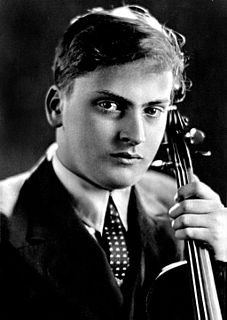A Quote by Plato
He who gives himself to a lover because he is a good man, and in the hope that he will be improved by his company, shows himself to be virtuous, even though the object of his affection turn out to be a villain, and to have no virtue; and if he is deceived he has committed a noble error. For he has proved that for his part he will do anything for anybody with a view to virtue and improvement, than which there can be nothing nobler.
Related Quotes
There are three levels of service. The highest level is that of one who performs good deeds the whole day and yet feels that he has not acheived anything. The second level is someone who, though he has not done anything, knows that he has not corrected anything in this world. This is good, and there is hope for him that he might correct his ways. However, someone who is righteous in his own eyes deceived himself all his life; his good deeds will be lost.
A man that hath no virtue in himself, ever envieth virtue in others. For men's minds, will either feed upon their own good, or upon others' evil; and who wanteth the one, will prey upon the other; and whoso is out of hope, to attain to another's virtue, will seek to come at even hand, by depressing another's fortune.
Therefore the good man ought to be a lover of self, since he will then both benefit himself by acting nobly and aid his fellows; but the bad man ought not to be a lover of self, since he will follow his base passions, and so injure both himself and his neighbors. With the bad man therefore, what he does is not in accord with what he ought to do, but the good man does what he ought, since intelligence always chooses for itself that which is best, and the good man obeys his intelligence.
Man has reason, discrimination and free-will such as it is. The brute has no such thing. It is not a free agent, and knows no distinction between virtue and vice, good and evil. Man, being a free agent, knows these distinctions, and when he follows his higher nature, shows himself far superior to the brute, but when he follows his baser nature can show himself lower than the brute.
God, Who is by nature good and dispassionate, loves all men equally as His handiwork. But He glorifies the virtuous man because in his will he is united to God. At the same time, in His goodness he is merciful to the sinner and by chastising him in this life brings him back to the path of virtue. Similarly, a man of good and dispassionate judgment also loves all men equally. He loves the virtuous man because of his nature and the probity of his intention; and he loves the sinner, too, because of his nature and because in his compassion he pities him for foolishly stumbling in darkness.
How much reverence has a noble man for his enemies!--and such reverence is a bridge to love.--For he desires his enemy for himself, as his mark of distinction; he can endure no other enemy than one in whom there is nothing to despise and very much to honor! In contrast to this, picture "the enemy" as the man of ressentiment conceives him--and here precisely is his deed, his creation: he has conceived "the evil enemy," "the Evil One," and this in fact is his basic concept, from which he then evolves, as an afterthought and pendant, a "good one"--himself!
No man, however enslaved to his appetites, or hurried by his passions, can, while he preserves his intellects unimpaired, please himself with promoting the corruption of others. He whose merit has enlarged his influence would surely wish to exert it for the benefit of mankind. Yet such will be the effect of his reputation, while he suffers himself to indulge in any favourite fault, that they who have no hope to reach his excellence will catch at his failings, and his virtues will be cited to justify the copiers of his vices.
There is no deception on the part of the woman, where a man bewilders himself: if he deludes his own wits, I can certainly acquit the women. Whatever man allows his mind to dwell upon the imprint his imagination has foolishly taken of women, is fanning the flames within himself -- and, since the woman knows nothing about it, she is not to blame. For if a man incites himself to drown, and will not restrain himself, it is not the water's fault.
Let no one imagine that he will lose anything of human dignity by this voluntary sell-out of his all to his God. He does not by this degrade himself as a man; rather he finds his right place of high honor as one made in the image of his Creator. His deep disgrace lay in his moral derangement, his unnatural usurpation of the place of God. His honor will be proved by restoring again that stolen throne. In exalting God over all, he finds his own highest honor upheld.
At that instant he knew that all his doubts, even the impossibility of believing with his reason, of which he was aware in himself, did not in the least hinder his turning to God. All of that now floated out of his soul like dust. To whom was he to turn if not to Him in whose hands he felt himself, his soul, and his love?
Clearly, what God wants above all is our will which we received as a free gift from God in creation and possess as though our own. When a man trains himself to acts of virtue, it is with the help of grace from God from whom all good things come that he does this. The will is what man has as his unique possession
Any piece of knowledge which the pupil has himself acquired- any problem which he has himself solved, becomes, by virtue of the conquest, much more thoroughly his than it could else be. The preliminary activity of mind which his success implies, the concentration of thought necessary to it, and the excitement consequent on his triumph, conspire to register the facts in his memory in a way that no mere information heard from a teacher, or read in a schoolbook, can be registered.
No man could bring himself to reveal his true character, and, above all, his true limitations as a citizen and a Christian, his true meannesses, his true imbecilities, to his friends, or even to his wife. Honest autobiography is therefore a contradiction in terms: the moment a man considers himself, even in petto, he tries to gild and fresco himself. Thus a man's wife, however realistic her view of him, always flatters him in the end, for the worst she sees in him is appreciably better, by the time she sees it, than what is actually there.
When you come to knowing God, the initiative lies on His side. If He does not show Himself, nothing you can do will enable you to find Him. And, in fact, He shows much more of Himself to some people than to others—not because He has favourites, but because it is impossible for Him to show Himself to a man whose whole mind and character are in the wrong condition. Just as sunlight, though it has no favourites, cannot be reflected in a dusty mirror as clearly as in a clean one.
The cause of all the blunders committed by man arises from this excessive self-love. For the lover is blinded by the object loved; so that he passes a wrong judgment on what is just, good and beautiful, thinking that he ought always to honor what belongs to himself in preference to truth. For he who intends to be a great man ought to love neither himself nor his own things, but only what is just, whether it happens to be done by himself, or by another.






































